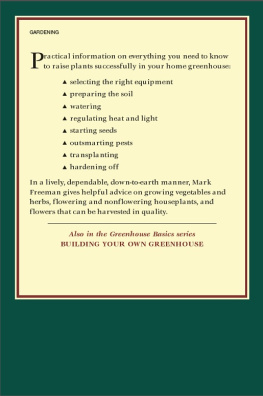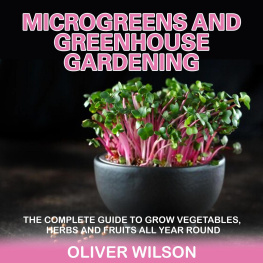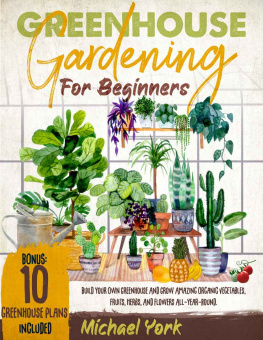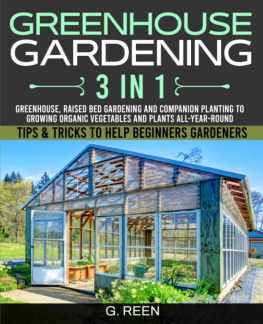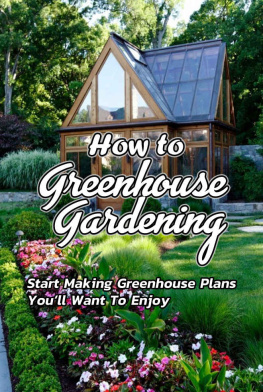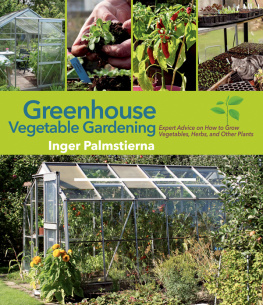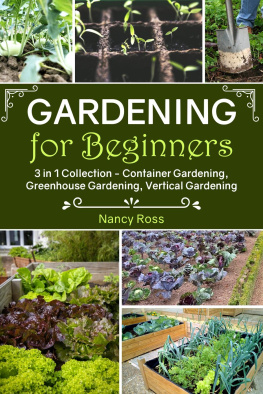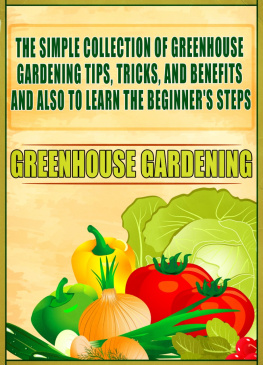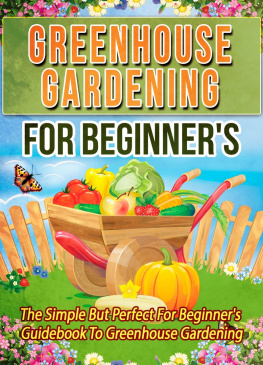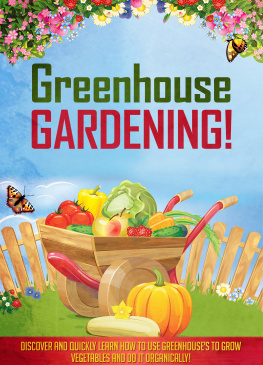.
GREENHOUSE GARDENING FOR BEGINNERS
2 Manuscripts in 1- Greenhouse Gardening and How to Build a Greenhouse
PHILIP CASTAGNETO
Copyright 2020 - All rights reserved.
The content contained within this book may not be reproduced, duplicated or transmitted without direct written permission from the author or the publisher.
Under no circumstances will any blame or legal responsibility be held against the publisher, or author, for any damages, reparation, or monetary loss due to the information contained within this book, either directly or indirectly.
Legal Notice:
This book is copyright protected. It is only for personal use. You cannot amend, distribute, sell, use, quote or paraphrase any part, or the content within this book, without the consent of the author or publisher.
Disclaimer Notice:
Please note the information contained within this document is for educational and entertainment purposes only. All effort has been executed to present accurate, up to date, reliable, complete information. No warranties of any kind are declared or implied. Readers acknowledge that the author is not engaged in the rendering of legal, financial, medical or professional advice. The content within this book has been derived from various sources. Please consult a licensed professional before attempting any techniques outlined in this book.
By reading this document, the reader agrees that under no circumstances is the author responsible for any losses, direct or indirect, that are incurred as a result of the use of the information contained within this document, including, but not limited to, errors, omissions, or inaccuracies..
TABLE OF CONTENTS
GREENHOUSE GARDENING
HOW TO BUILD A GREENHOUSE
.
GREENHOUSE GARDENING
A complete guide to build a greenhouse and grow your own herbs, fruit and vegetables
PHILIP CASTAGNETO
Introduction
Versailles had about 1,000 orange trees in one location between 1684 and 1686.
Think about it. All those orange trees clustered together. It would be such a wonderful sight now wouldnt it? Makes you wonder why they had to remove those trees in the first place, doesnt it? Also makes you wonder: where in Versailles could you have seen such a majestic sight? Does it still exist on the map today?
The first thing you should know is that those trees were not removed. And secondly, the orange trees were inside a building.
Surprised? Well, I guess you wouldnt be because you know the title of this book and you know where I am going with this.
You see, those trees were grown artificially within a large greenhouse
But that is not the oldest record of a greenhouse. Far from it, in fact.
If you would like to know the origins of greenhouses, then we have to travel back to the ancient land of Rome, when conquerors were being backstabbed by their relatives in court and gladiator matches were like watching NFL on a Sunday afternoon.
It was around 30 A.D. that a certain Roman emperor named Tiberius wanted to have more cucumbers.
To be more precise, he needed to have at least one cucumber a day. This was a requirement prescribed by his physicians, to help him with a certain medical complication. Immediately, many Roman gardeners and engineers had to find a way to create a constant supply of cucumbers, which would not usually be a challenge if not for the fact that they had to ensure that these cucumbers were especially grown for the emperor alone. Talk about royal privileges.
Here is another challenge. The cucumbers had to be grown all year long. But does one grow the same plant throughout the year?
You might think that all it requires is to plant the seeds, water them, add some sunlight, and voila! That is not how it works. Cucumbers work well during moist and warm seasons. This means that the gardeners and engineers had to find a way to grow them during the winters. Even in the snow. Yes, it did snow in Rome, despite what they show in the movies. It wasnt always sand and desert.
To grow the cucumber for the emperor, the gardeners used a wheeled cart to transport the cucumbers from one place to another. They would place the cart under the sun, where the cucumbers received the necessary sunlight. When winter arrived (or when it was nighttime), the gardeneres used a special cover for the cucumbers. The cover was made using transparent materials, which allowed any sunlight to pass through, but gave relative warmth to the cucumbers inside.
Because of this, the emperor could enjoy some delicious cucumbers. It was a case of a cucumber a day kept the Roman physicians away.
For the longest time, people considered greenhouses to be a recent invention. While the modern glass versions of greenhouses were recently discovered, the idea behind greenhouses has been in existence for a long time.
Greenhouses provide a safe space and environment to grow plants, vegetables, and even crops. You can usually find them in cold regions like Finland, Greenland, and certain parts of Canada, but they are not secluded to those countries. They have a transparent covering that is typically made of glass. The transparency allows sunlight to filter through during the day. When darkness takes over the brightness of day, the greenhouse traps the heat inside, allowing the plants to receive warmth even if the temperatures outside the greenhouse dip closer to zero degrees.
It is an ingenious invention that is based on scientific findings and research, especially physics. In fact, the name greenhouse itself is a term that is associated with climate change.
The term refers to a process where temperatures on Earths surface increase. In this process, gases such as carbon dioxide prevent the heat of the sun from escaping, just like what the glass roofs of greenhouses do with the heat the enters them.
Greenhouses not only help grow food properly, but they are environmentally friendly.
That statement might raise a few eyebrows. After all, how can greenhouses themselves contribute towards the environment? Do they produce beneficial gases that block harmful gases from accumulating? Is it because there are many plants growing inside? Neither. You see, when countries need food, they need to depend on imports. This means that they need to use various modes of transportation in order to get the required food. The number of ships and planes that carry food is large and the fuel they burn is tremendous. All the exhaust from these ships and planes affects the environment. Now think of the situation where a country has numerous greenhouses to meet the food requirements of their country.
They dont have to depend on trade for food and through that, they reduce the worlds fuel consumption and dispersion.
They become independent and can actually minimize spending on imports.
They grow their food naturally and can deliver it to the masses faster than when they were reliant on imports from other countries.
Not only is the country protecting the environment, but they are gaining so many benefits through the use of greenhouses.
So now that you are acquainted with a brief introduction on greenhouses, it is time to add a slice of nature in your backyard!
Before jumping in your greenhouse gardening journey, you can download a free and useful guide about compost.
Click the link below and get your free copy:
https://forms.aweber.com/form/10/223814310.htm
Thank you for choosing my book and, if you enjoy it, please, make sure to leave your opinion on Amazon.
Have a good reading!
Chapter 1: Going Green!
When trying to build your own greenhouse, you might need to be aware of one important point; there are various kinds of greenhouses that you can choose from. Your choice of greenhouse reflects multiple factors, from the resources you have available to the space you have set aside for your greenhouse to the frequency of gardening.


